
1
Lora Sonnen
Michelle Anderson-Irons
Joe Glithero
Shannon Peterson
Declan Daly
Brynna Mosely
Station Stop Report
The city of Blaine, WA has tasked international business
students at Western Washington University with
researching the feasibility of an Amtrak passenger rail stop.
The following report discusses the demand for a station
stop, a market analysis, the benefits and challenges of this
project, a survey of potential demand and suggestions for
further research. This report should help with establishing
future station stop assessments as well as provide decision
makers with the information necessary to determine how
and if they should proceed with the proposed project.
Amtrak Stop Evaluation – Blaine, WA
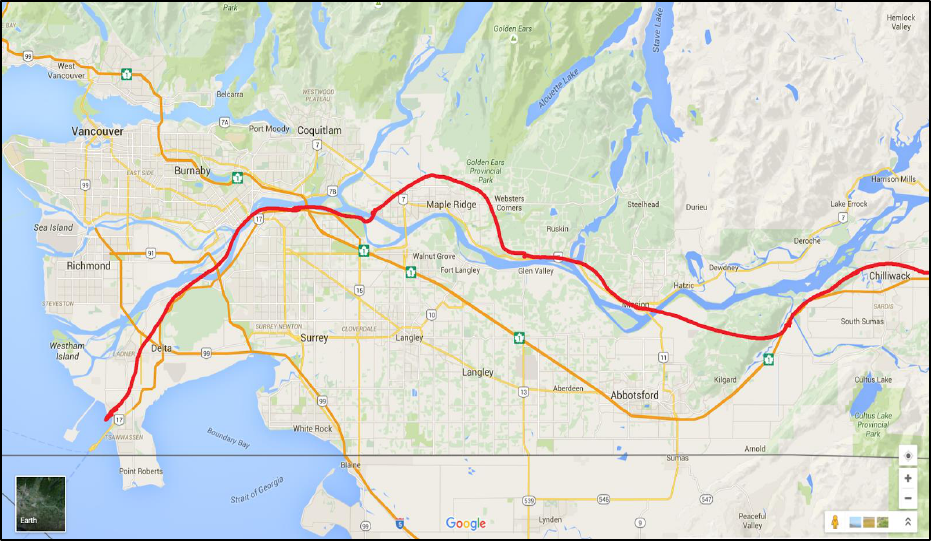
2
Market Analysis
______________________________________________________________________________
Target Market:
Customers for the proposed station stop in Blaine would primarily come from lower British Columbia,
with a secondary market in Blaine and the surrounding areas. This study has concentrated on the
market in lower mainland Canada, where the majority of our target market lives. The target market in
B.C. can see several advantages of taking the train out of Blaine, including time saved, money saved, and
more. The map below identifies a boundary where the Canadian cities below the red line can drive to
Blaine faster than they can drive to Vancouver. This line could be moved even further north when the
60-minute wait time for customs at the Vancouver station is taken into account.
Within this boundary, we identified several major Canadian cities where passengers would have a time
based advantage of taking the train from Blaine rather than from Vancouver. These cities amount to a
population of approximately 1.1 million people, making it a sizeable target market. This station could
also be utilized by residents of Blaine and the surrounding areas, as well as business people traveling
south to Seattle.
Boundary for Canadian cities where drive time to Blaine is faster than drive time to Vancouver
Source: Google Maps
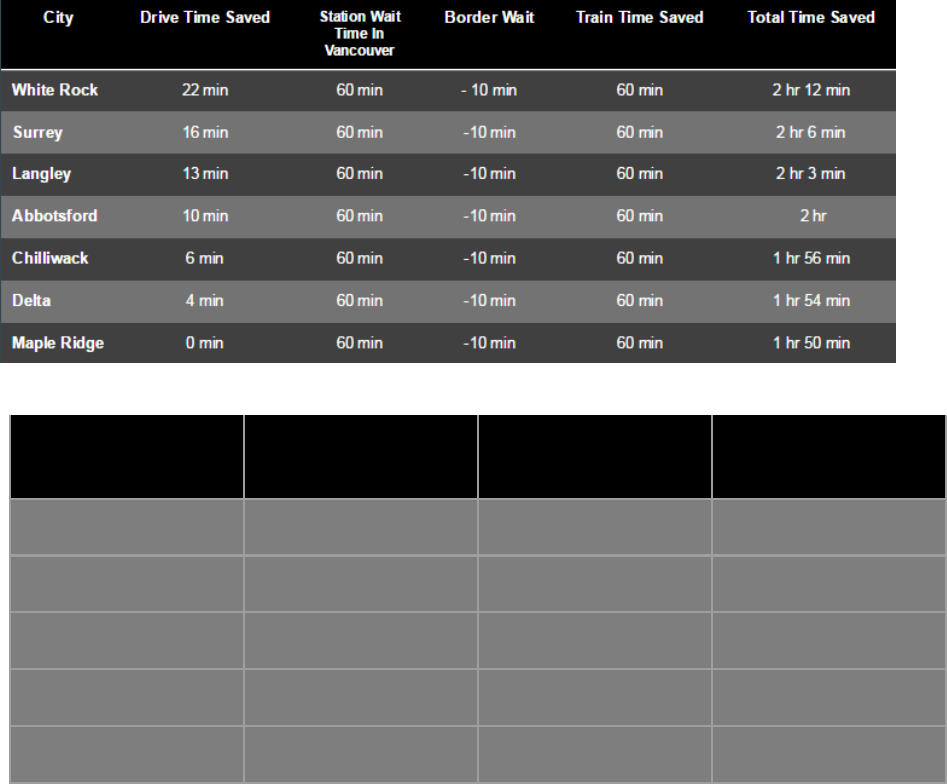
3
Alternative Modes of Transport:
Transportation Type
Daily Frequencies
from Vancouver
Average Cost
(Van. to Sea.)
Travel Time
Amtrak
2
$48.00
4hrs. 25 min.
Quick Shuttle
4
$50.00
4 hrs. 30 min.
Bolt Bus
4
$28.50
4hrs.
Greyhound
3
$35
4 hrs. 20 min.
Personal Car
N/A
$23.10
2 hrs. 50min.
As seen above, we estimate there are five key modes transportation that people utilize when travelling
between Vancouver, B.C and Seattle. The cheapest and quickest is driving your personal car assuming
you get around 20 miles per gallon, but this does not factor in having to pay for parking or any other
hassles involved in driving around in a large metropolitan city. This number does not include the
additional cost of driving that comes from insurance and wear and tear. Potentially a better way to look
at the cost of a personal car would be to use the government rate of 57.5 cents per mile, which would
drastically change the price to a much higher cost (141 miles x 57.5 cents= $81.08). The train stacks right
Time Saved: Blaine v. Vancouver
The graph below shows how much time passengers from these cities can save by taking the train from Blaine,
taking into account average border wait times and the time it takes to ride the train from Vancouver to Blaine.
On average, passengers would save 2 hours by taking the train from Blaine. It is important to note that a new
station in Blaine would not so much be taking customers away from Vancouver, but rather creating new
customers that are more willing to ride the train with the addition of the stop in Blaine.

4
in with the rest according to cost and travel time but has the least flexibility when it comes to daily
departures. For those staying overnight, it would be perfectly attractive.
SWOT Analysis: Evaluation of a Stop in Blaine
The following table outlines the strengths, weaknesses, opportunities, and threats to an Amtrak station
stop in Blaine. Strengths and weaknesses pertain to the town of Blaine itself, while the opportunities
and threats relate to the external environment. All of these factors should be considered in determining
the feasibility of adding a station and will be addressed in more detail below.
In the SWOT analysis above it is important to note that leaving from Blaine would let you get to the
station at 8:00 AM versus having to be in Vancouver at 6:00 AM, resulting in 2 extra hours of sleep.
In the weakness category we have much more to discuss because those would go away if a new station
is built in a new location. In the threats category we spoke with Amtrak and some passengers and found
that many of the passengers riding are from Europe during the winter months and the threat would be
them not having a way to get to Blaine because they are most likely going to be touring Vancouver, not
cities closer to Blaine.
Strengths
Weaknesses
● Location
● Time savings
● Money savings
● Convenience
○ Less traffic
○ Parking availability
○ Avoid double customs
Enjoy the city of Blaine
● Location
○ Unpredictable wait at
border
○ Miss the view between
Vancouver and Blaine
Current lack of parking/station
Opportunities
Threats
● Growing economy
● Large target market
● Market for eco-friendly travel
● Other modes of transport
● Ridership stagnation
● Seasonal ridership
● Foreign travelers can’t get to Blaine
by car

5
Positives and Negatives for Train Riders:
Keep in mind that the pros and cons outlined above are for overall train ridership on the Amtrak
Cascades line out of Vancouver. The biggest positive is the extra space and comfort that the train
provides, allowing for a more comfortable (less cramped) ride. The largest negative impact is that there
are only two trains per day, allowing for low flexibility on one day travel, but for travels lasting longer
than one day the low availability can be overlooked.
Advantages of a Station in Blaine:
Less traffic to the station
Sleep in
o Train in Vancouver requires an arrival time of 6:00 am vs. 8:00 am in Blaine
Other amenities
o Pick up groceries, gas, and mail in the U.S.
o Enjoy the city of Blaine
Avoid the slow train ride between Vancouver and the US border
Faster border crossing
o Don’t have to clear customs 45 minutes before train departure as in Vancouver
o Border crossing in the morning averages 5-15 minutes, which is made faster with a
Nexus pass
Advantages for the City of Blaine:
Get Blaine “on the map”
Economic stimulus
o Increased tourism and business for the rest of WA state
o Bring in money through parking and passengers patronizing local businesses
o Potential to lead to new businesses and jobs being created
Positives
Negatives
Flexibility of travel – ability to
work or relax during transit
Less security hassle
Comfortable ride
WIFI
Scenic views
Eco-friendly
o More energy efficient per
passenger than cars or
planes
Uncertainty of border wait times
The ease of Skytrain/bus travel in B.C.
Only two trains per day
International travelers (46% of passengers in
Vancouver) will not have a car to travel down
to Blaine
Miss the beautiful ride between Vancouver and
Blaine
Ridership in Vancouver stagnating
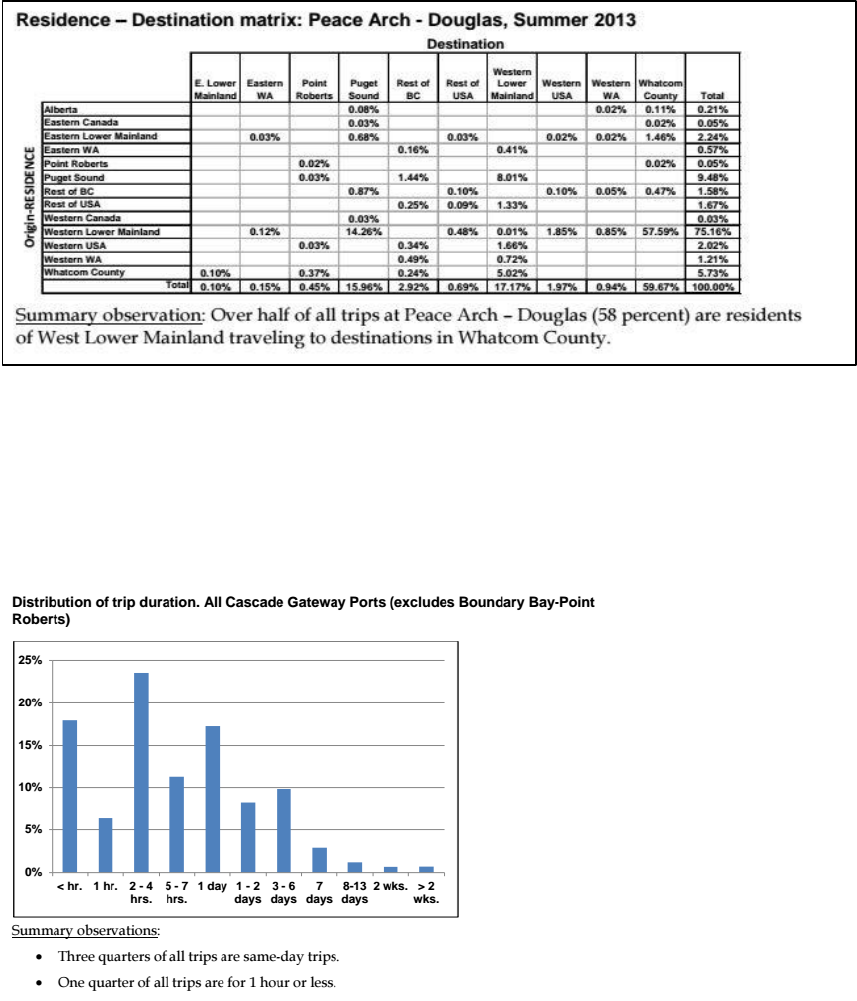
6
Travel Demographics:
______________________________________________________________________________
One of the important aspects of this study is to determine why and to where people are riding the train.
Lacking information on train travel destinations, we have used data from a study conducted on
passengers crossing the Peace Arch – Douglas Border by car. This data was compiled from a poll of
approximately 3,000 people, 77% of whom were Canadian. This information will serve to help determine
how to market the proposed station. It can also be used to extrapolate data regarding demand at the
Blaine station stop.
Based on the graph above, we can determine that 59.67% of travelers stay within Whatcom County.
Trains have a certain luxury about them for travelers, thus making them more popular for longer trips.
The fact that over half of travelers entering Blaine are staying in the same county could mean less
demand for services like the train.
Length of Trips:
Over ¾ of all trips across the
Cascade Gate Ports in the summer
of 2013 were same-day trips. The
train would only depart Blaine
twice per day, making a day trip
less convenient
Reasons for Travel:
Source: IMTC Passenger Vehicle Survey, 2013
Destinations of Travelers:
Source: IMTC Passenger Vehicle Survey, 2013
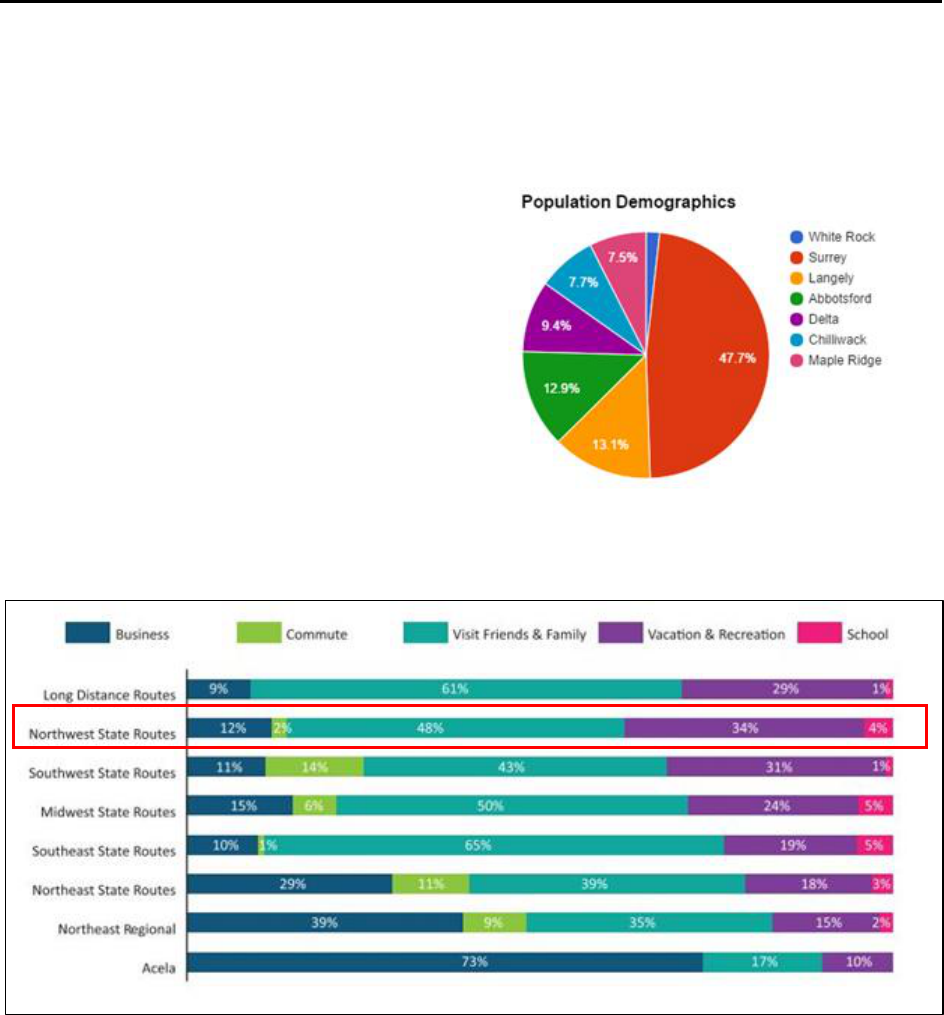
7
Marketing Strategies
If a train station is added in Blaine, it will be important to consider who to market to and how to market
the station. Based on our observations, the stop in Blaine will need to create brand new customers,
primarily from the target cities identified, who currently do not currently ride the train. Blaine will need
to market the benefits of the station (and
Blaine itself) in order to attract the target
market.
Marketable Population Densities:
● Cities below the Fraser River
● Total population that could be
served: 1,076,762
● 47% of marketable population
from Surrey
● Narrow down to the largest cities
to get into contact with to begin
demand surveys
Reasons for Traveling by Train:
In regards to the Northwest State Routes, 48% ridership is due to Visiting Friends and Family, and 34%
for Vacation and Recreation. When beginning to think about how to market the Blaine Train Station, it is
important to take account for why people are using the train. Since a large number of people are using
Source: Amtrak’s Economic Contribution Report, Dec. 2014
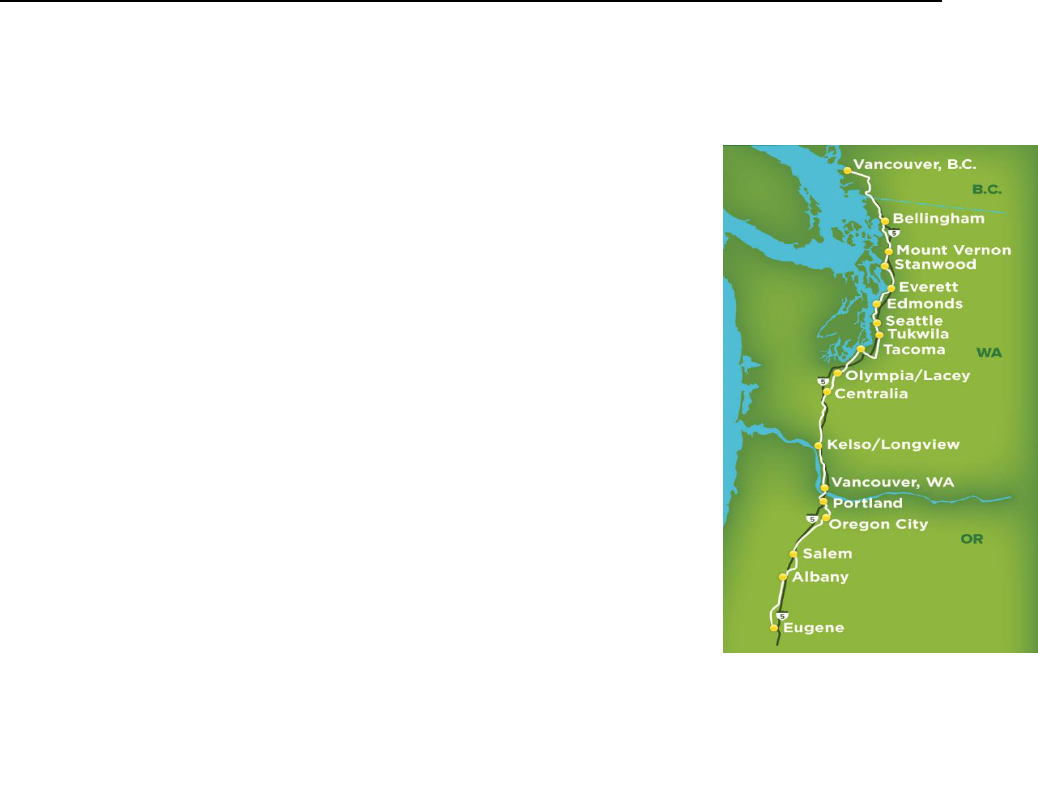
8
the train to visit family and friends and as well as vacation and recreation, it would be good to use some
marketing strategies to cater to this particular set of people.
Factors to Consider
When looking at the feasibility of a station stop in Blaine, we wanted to look at some examples
of other areas where new stations have been added to existing rail lines. We found two
examples on the east coast, in North Brunswick, New Jersey and in Wallingford, Connecticut.
The stations were added in hopes to improve time performances and
streamline commuting for residents. The station alone in New
Brunswick will cost about $30 million, while the one in Wallingford is
estimated at about $24 million. However, this would include the cost of
new sidings for the locations. Since Blaine already has a siding leftover
from when the train stopped there previously, this would reduce the
cost of a station down to an estimated $1.5-2 million. It should also be
noted that the two east coast stations were added to busy commuter
lines, where trains run about 12 times a day, compared to the Amtrak
line which runs much less frequently. In addition, a new stop in Blaine
would add to the travel duration. If Blaine is to apply for a station, it will
have to explain to Amtrak how the train will make up the time from the
stop at Blaine. Called, ‘mitigation,’ this cost will have to be considered
in any analysis of the Blaine station. Leavenworth, in building the case
for its station, was able to combine local, state and national funding
sources for the mitigation.
This map of the northwest Amtrak stations shows that the distance
between the Bellingham and Vancouver stops is the longest
uninterrupted stretch on the line. A Blaine station could potentially serve a customer base of
well over 1 million people, which is far greater than some of the populations that other stations
such as Stanwood or the Mt. Vernon service. This raises the question of if Amtrak is missing
untapped market potential.
Source: Amtrak Cascades, 2015
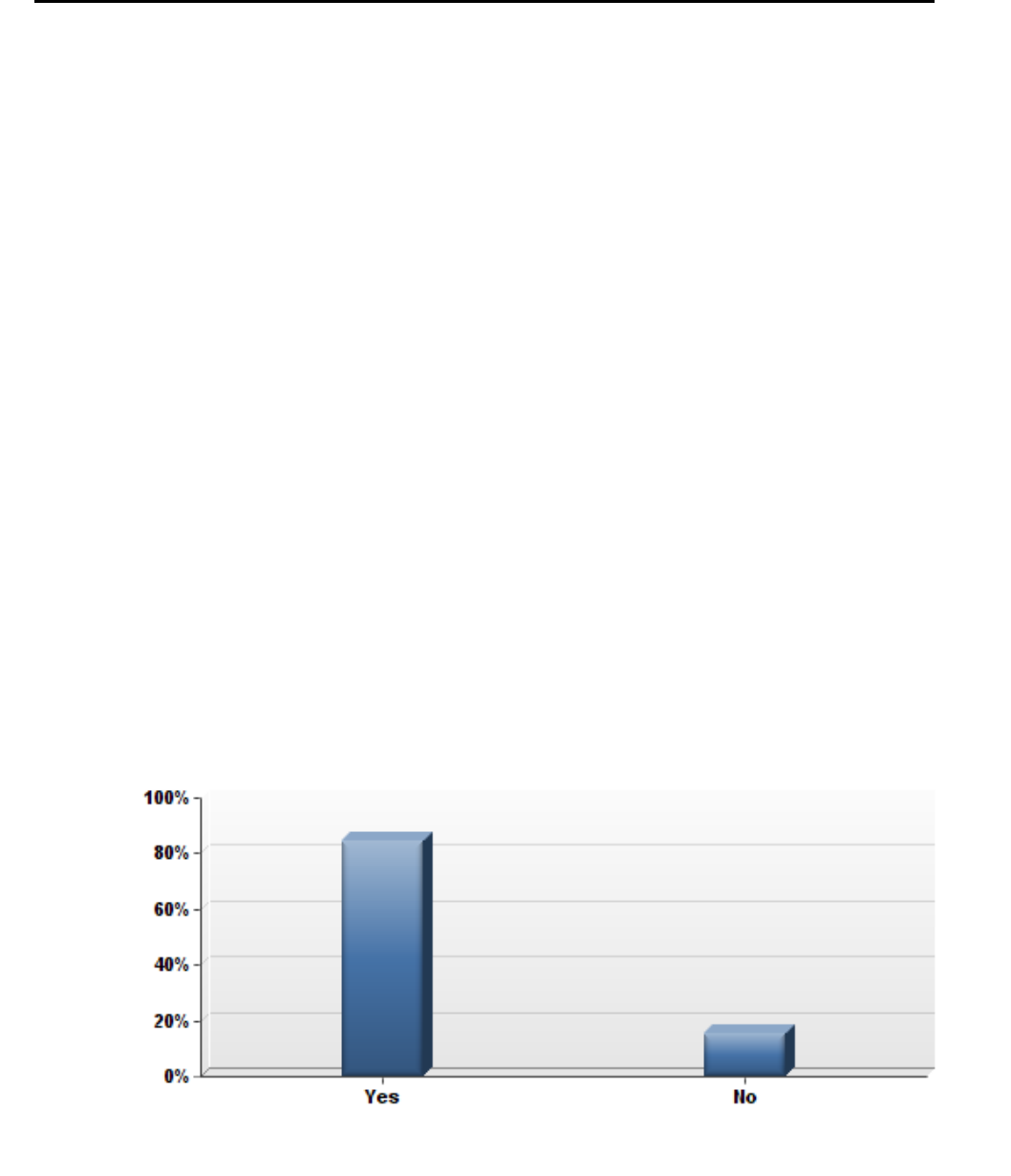
9
Survey of Potential Demand for the Blaine Station
Purpose:
Our goal was to create a survey that we could use to gauge the potential interest and demand for a
station stop in Blaine. Once again, the target demographic for a Blaine station are Canadian residents in
the lower mainland area of British Columbia, business travelers, and residents of Blaine and the
surrounding areas. We wanted to understand the demand of these demographics in order to determine
their interest in a station in Blaine.
Distribution:
We distributed this survey through advertisements on the city of Blaine website, newspaper publicity in
the White Rock Sun and the Peace Arch news, flyers around Blaine, inserts in Blaine city electric bills and
distribution to train enthusiasts via email. The Surrey Board of Trade was also kind enough to send out a
survey to their community, which helped us reach a large number of Canadian respondents. At the end
of our survey, we received 929 responses, 223 from Canadians.
Method:
We first needed to divide our sample into two separate populations; Canadian residents and American
residents. This information will prove particularly valuable when we arrive at later questions about
where and why the train is being used. From our 929 responses we were able to gather information
from 443 American residents and 486 Canadian residents (219 from our survey and an additional 267
from our assistance with the Surrey Board of Trade). It is important to note here that the Surrey Board
of Trade did not separate their findings into these two populations. It is assumed all responses received
from the Surrey BOT are from Canadian residents. Having separated our two populations, the following
questions were directed at each group independently.
Table 2: Have you ever taken an Amtrak Train? – American Response
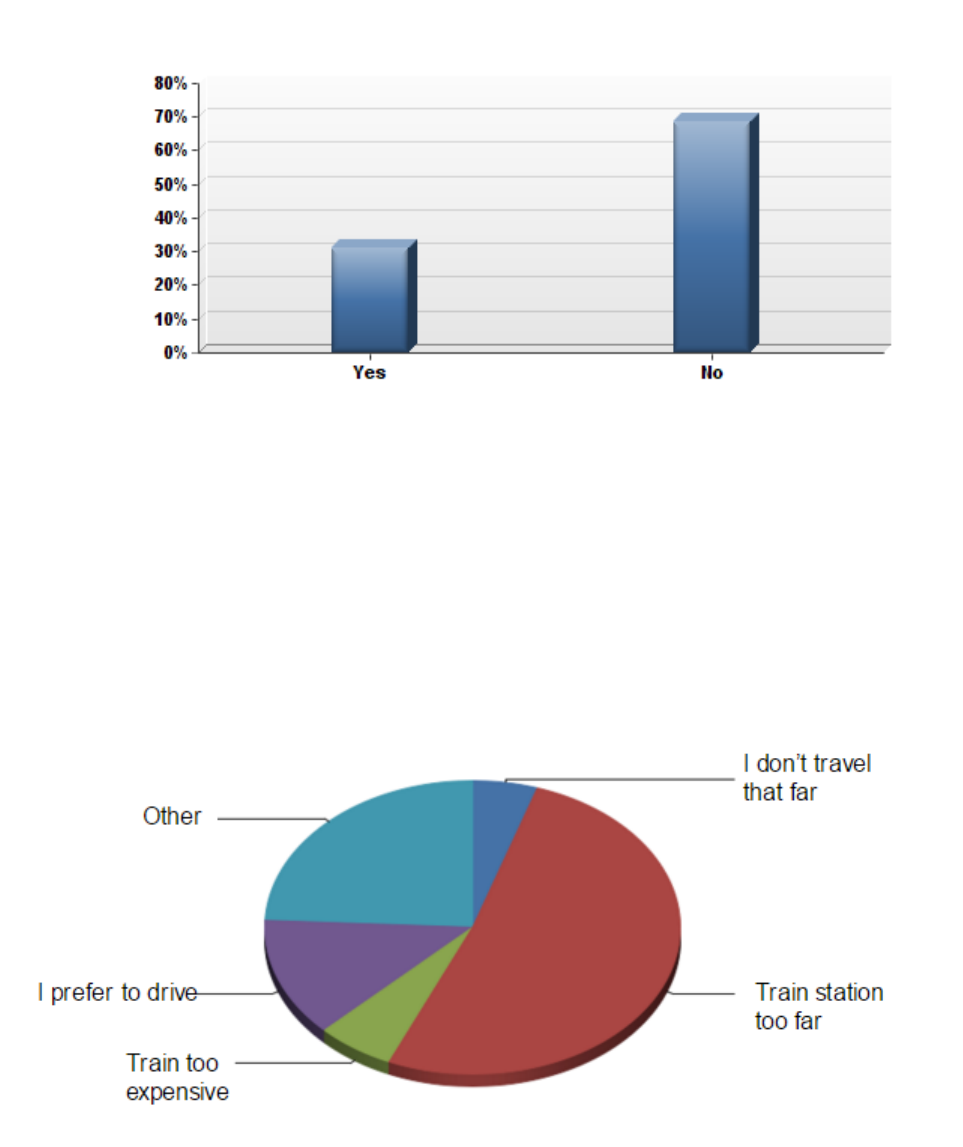
10
Table 2.1: Have you ever taken an Amtrak train? - Canadian Response
Ridership Frequencies:
As shown in Table 2.1, there are a significant number of Canadian residents who have never ridden an
Amtrak train. Almost 70% of Canadian respondents have never considered the train as an option. This is
a sizable market that could be captured by Amtrak. In addition, those who have taken the train
previously could start to ride the train more frequently. In order to determine if this rider base could be
captured by a station in Blaine, we need to know why these residents are not riding the train.
Table 3: Why don’t you take the train? - American Residents
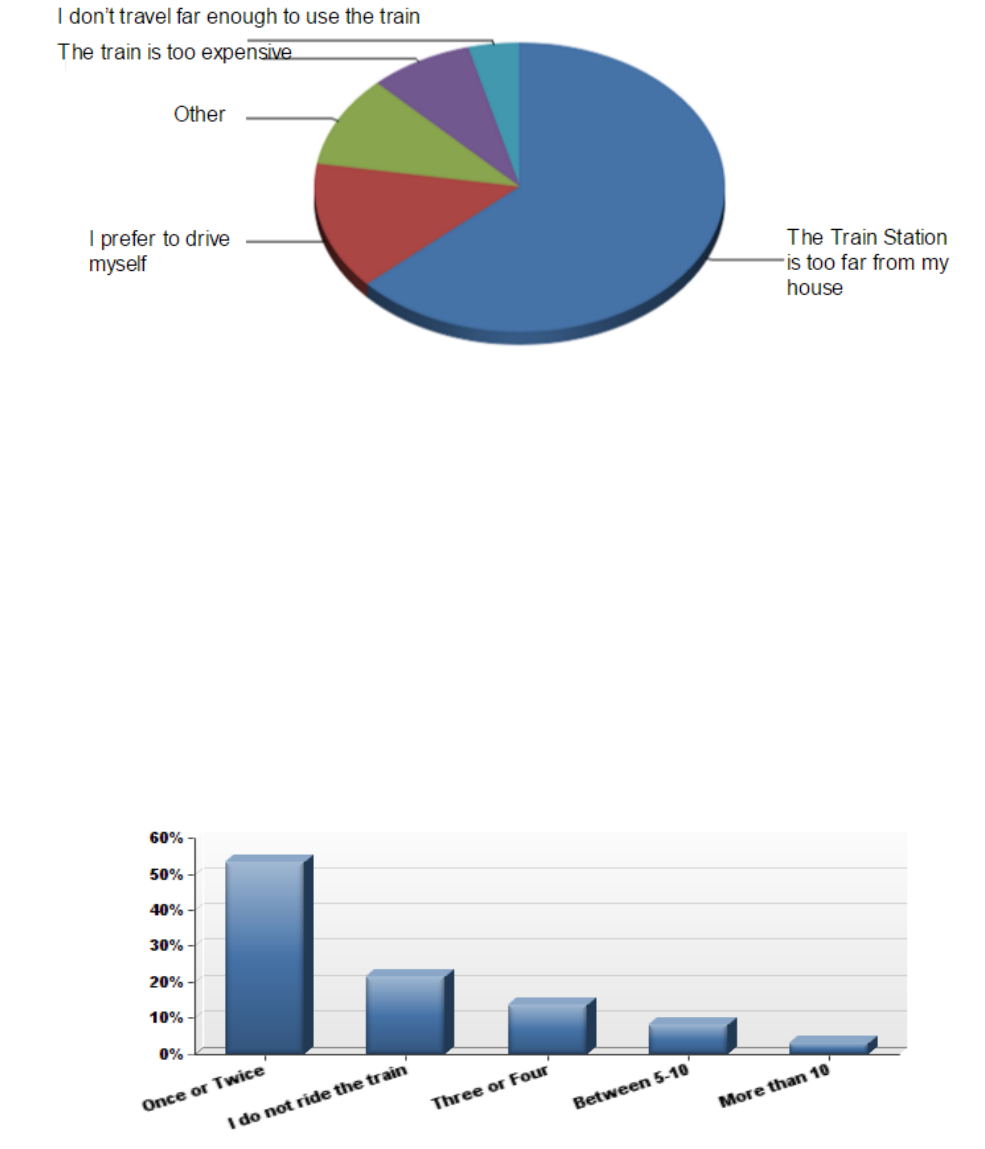
11
Table 4: Why don’t you take the train? - Canadian Residents
The general consensus drawn from our responses is the current station options are simply too
inconvenient. Over 50% of respondents on both Table 3 and Table 4 feel that the current stations are
too far from the passenger’s homes. We gave our respondents an opportunity to type their reasoning if
they chose the “Other” option, and the responses led towards a similar conclusion. Whether it be a
timing inconvenience or a departure/arrival scheduling issue, almost all responses we received from
those who currently do not ride the train say this is due to inconvenience.
We know that this significant population is not riding the train, and we are starting to get an idea of
why. However, we also need to know a few things about the travel habits of those who have taken an
Amtrak. For those that responded “Yes, I have taken an Amtrak Train” we need to know how often they
ride the train per year.
Table 5: How Often Do You Take the Train? - American Respons
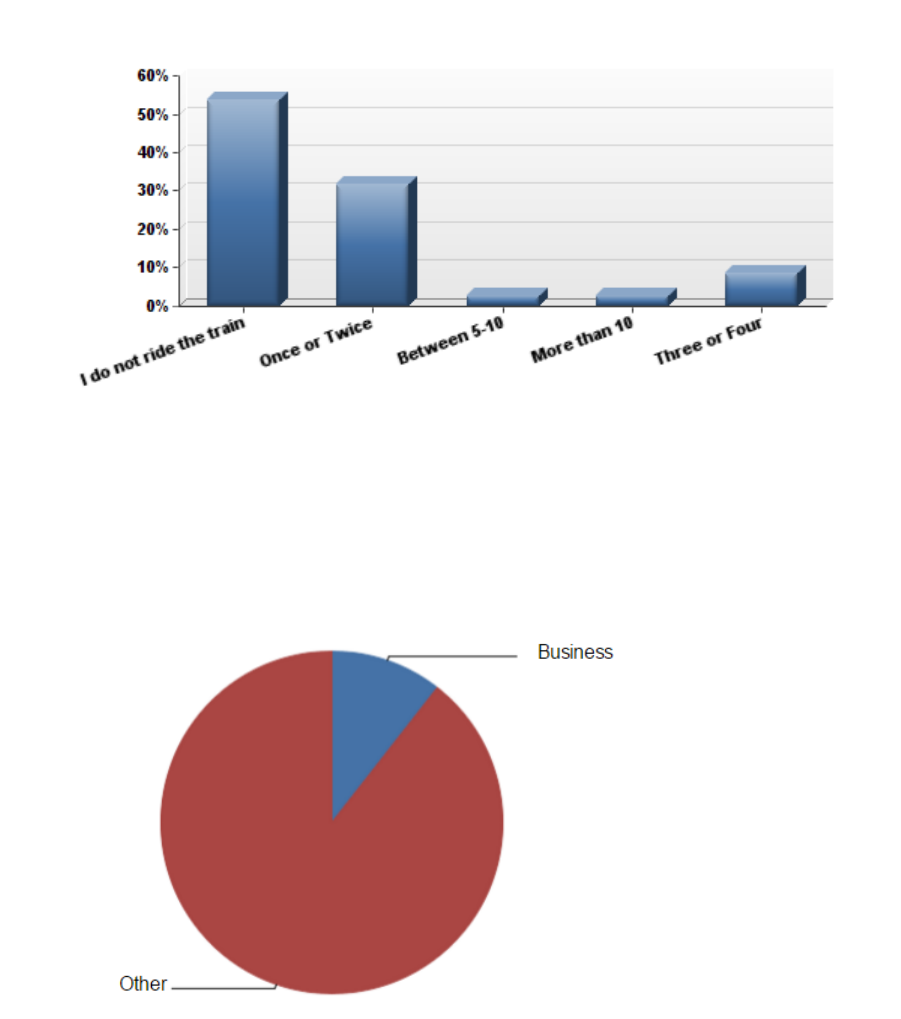
12
Table 6: How Often Do You Take the Train? - Canadian Response
As shown in the first two bars of Table 5 and Table 6, a majority of those riding the train are only doing
so once or twice per year. This low frequency begs the question of whether there will be enough
ridership to justify the cost of a station in Blaine.
Business or Pleasure?
Table 7: American Response
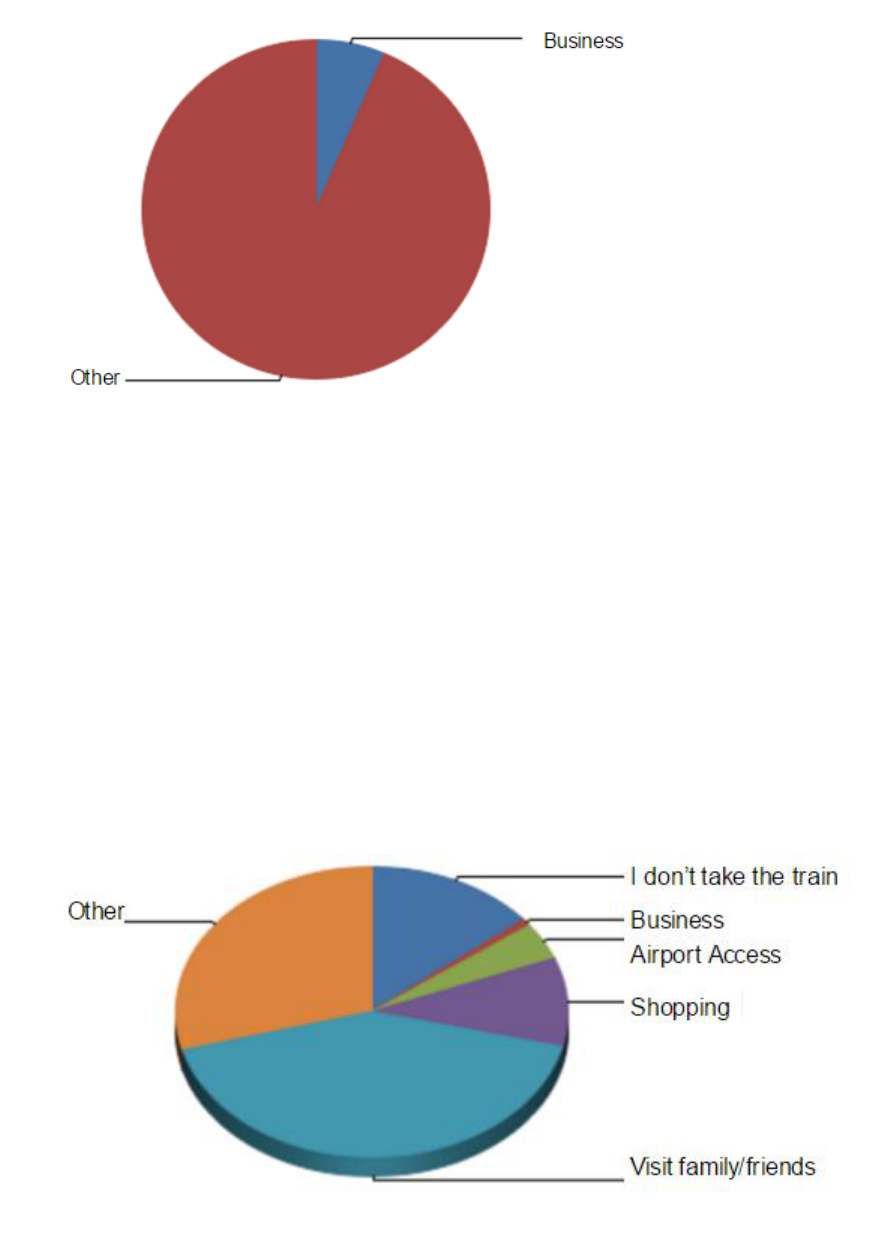
13
Table 8: Canadian Response
Our immediate assumption upon creating this survey was that a large portion of our target demographic
would be those traveling for business purposes; travelers that would potentially use the train once a
quarter or even once a month for business trips.
Almost all of the respondents stated they would not be using the train for business purposes. Due to our
large sample of responses, this leads us to believe that there might not be a large market of business
travelers willing to take the train. To proceed in attracting business ridership in the future, further
investigation should be undertaken to specifically gauge what business travelers want and need in
regards to train travel.
Why Do You Take the Train?
Table 9: American Response
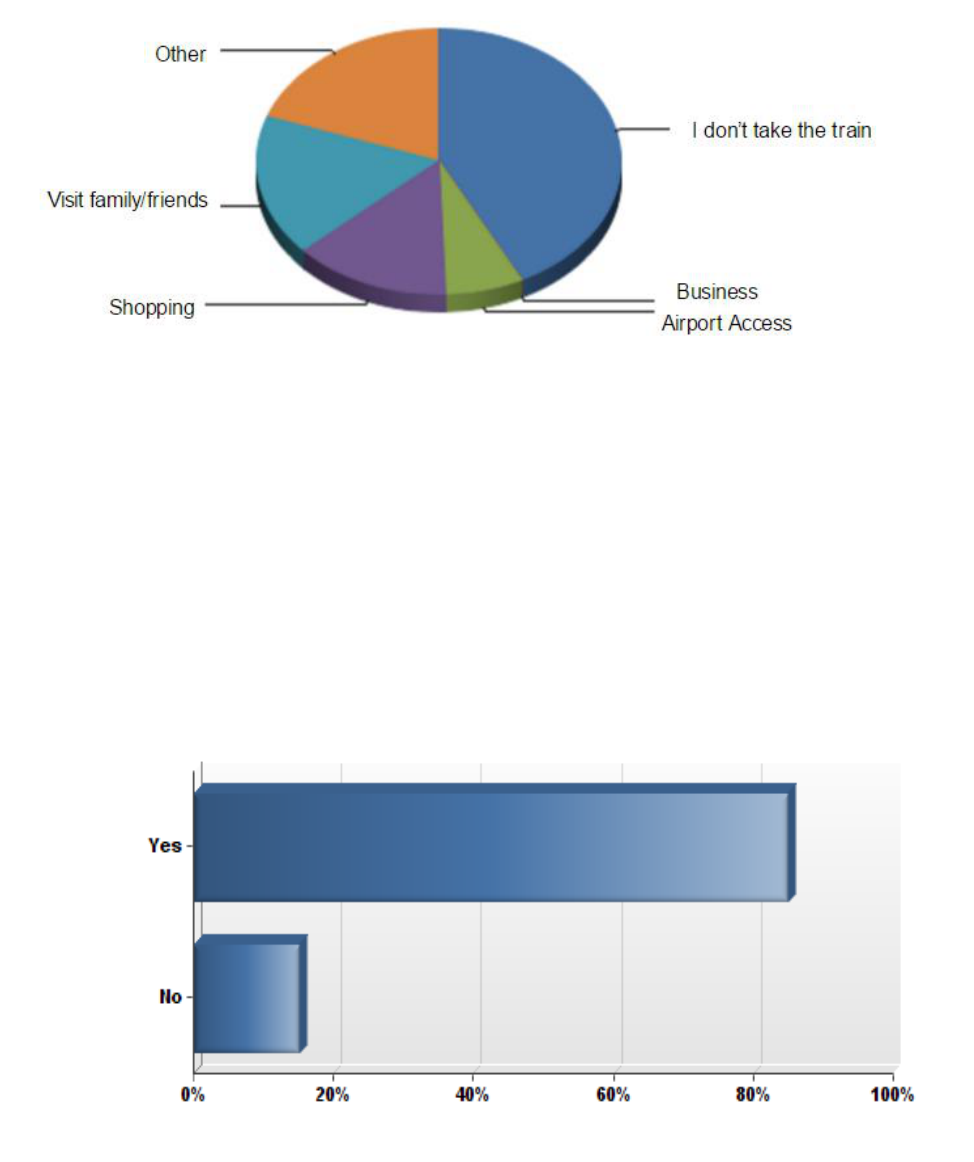
14
Table 10: Canadian Response
We asked whether our respondents were taking the train for business or leisure purposes, and our
responses were almost exclusively leisure. The largest portions of Table 9 and 10 show passengers are
riding the train for leisure activities such as shopping and visiting relatives. Again, respondents were
given the opportunity to type in a response if they chose “Other”. These were largely leisure activities
such as traveling to sporting events, concerts, vacationing, etc. This reinforces the market we reached is
riding the train only once or twice per year solely for leisure purposes.
If there were to be a station in Blaine, would you take the train?
Table 11: American and Canadian Responses
Most importantly, our survey was intended to find whether or not people would feel more inclined to
ride the train with a station in Blaine. For those of us who would like a station in Blaine, we received
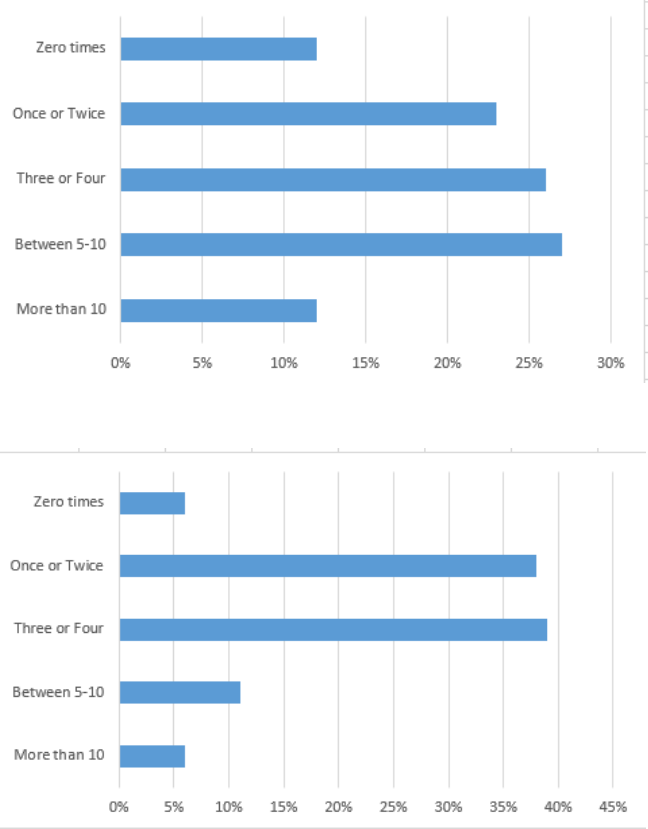
15
exactly the response we were looking for. An overwhelming 80% of all who responded believe that if
there were to be a station in Blaine they would feel more inclined to take the train. If passengers
speculate that they are more likely to ride the train from Blaine, we need to know at what level of
frequency.
How often per year would you take the train from Blaine?
Table 12: American Response
Table 13: Canadian Response
These results are overwhelmingly optimistic. Respondents believe they will increase their usage from
one to two times per year, to three, four, maybe even five or more trips with the added station in
Blaine. It is important to note that these results are merely speculations made by the respondents and
are subject to exaggeration. It is important to note that if a significant proportion of the total population
amounting to over 1 million residents in the lower mainland and Blaine area start to ride the train even

16
just once or twice a year, this could potentially generate a high level of ridership frequency and become
a lucrative market for Amtrak.
What would make you ride the train more from Blaine?
Table 14: American Response
Table 15: Canadian Response
Exactly as expected, these potential new commuters believe they would ride the train more often
because it will be more convenient. The large blue section of the chart in both Table 14 and 15 show
that residents would ride more because the station in Blaine would be closer to their residence. The
large red section shows the train leaving at a more convenient time. Collectively these two pieces alone
account for over 50% for both the Canadian and American residents. These results show that the biggest
incentive for potential customers is convenience, and a Blaine station would be able to meet that need.

17
Statistical Conclusions
From the data collected by our 929 respondents, we can draw a few statistical conclusions.
Current riders of the train are using the train about once or twice per year.
They are riding for leisure purposes such as going to sporting events and shopping.
A main reason why people are not riding the train is due to the inconvenience of the large
distance to the nearest station as well as scheduling conflicts.
Just about 80% believe they would utilize the station in Blaine because it would be more
convenient. We believe with an added station in Blaine we will be able to attract more riders;
however, they too will only be riding the train between two and four times per year for leisure
purposes.
There is little doubt that the Blaine station will be used. This data just begs the question of how
frequently the added station will be used.
Final Thoughts
In response to the open comment portion on our survey, we received a large amount of positive
feedback regarding how a station in Blaine would be received by the community. Many respondents
who live in the area mentioned the inconvenience of getting to either Vancouver or Seattle for train
travel, and felt that a station in Blaine would increase the likelihood that they will utilize the train The
convenience and proximity of the Blaine station were the biggest incentives according to our
respondents. Respondents stated that the Vancouver and Bellingham stops were too far or
inconvenient, but felt that a stop in Blaine would cause them to ride the train more frequently.
The distance between the Vancouver stop and the Bellingham stop is one of the longest stretches on the
northwest Amtrak line. This begs the question of whether Amtrak is really serving all its potential
customers, and whether they are not tapping a possibly lucrative market in the lower mainland and
border area.
If Blaine is to apply for a station, it will have to explain to Amtrak how the train will make up the time
from the stop at Blaine. Called, ‘mitigation,’ this cost will have to be considered in any analysis of the
Blaine station. Leavenworth, in building the case for its station, was able to combine local, state and
national funding sources for the mitigation. There is also the possibility of removing a lesser used station
from the line to make way for the market at the Blaine station.
After looking over our survey results, we think it is obvious that most train riders are currently using it
for leisure purposes, and the number of riders using it for business travel is a very small portion of users.
If this research is continued, it would be important to reach those who travel frequently between
Vancouver and the surrounding area to southern destinations and find out what would motivate them
to use the train more frequently. Since the respondents declared that they would be using the train for
leisure purposes, it is unclear whether this would create enough rider frequency to warrant a station in
Blaine. However, if a large portion of the entire 1 million population of the lower mainland rode once or
twice a year, than it could be a lucrative market for Amtrak. Marketing research shows a lack of
understanding in products people have not yet been exposed to or experienced. The use of this
18
potential station could be lower or higher than projected. Once passengers realize the great
convenience of this new station it is also quite possible it be used more than projected.
Despite the great benefits it brings to Canada, the Canadian government does not currently give any
funding towards the operation of the AMTRAK trains between Vancouver and Seattle. If more Canadian
customers rode the train from a Blaine stop, the States of Washington and Oregon would have a better
chance of getting Canadian officials to collaborate and provide support for the AMTRAK service from
Vancouver to Seattle.

19
Bibliography:
"A Look inside Amtrak's Excellent Content Marketing Strategy." Econsultancy. Web.
<https://econsultancy.com/blog/65338-a-look-inside-amtrak-s-excellent-content-marketing-
strategy/. >.
"Amtrak's Economic Contribution." AECOM. (2014). Print.
"Amtrak Is 'On Time' with Its Content Marketing Strategy-How Marketers Can Catch Up to
Amtrak's Speed."
<http://www.contentboost.com/topics/content-marketing/articles/387625-amtrak-on-time-with-
its-content-marketing-strategy.htm>.
"Amtrak - Rouses Point, NY (RSP)." Train Web. Web. 2 Dec. 2015.
<http://www.trainweb.org/usarail/rousespoint.htm>.
"Canada: British Columbia." British Columbia (Canada): Province, Major Cities, Towns &
District Municipalities. N.p., n.d. Web. 09 Dec. 2015.
<http://www.citypopulation.de/Canada-BritishColumbia.html>.
"Council Considers Future of Retail Sales, Train Stop in Blaine." The Northern Light 18 Feb.
2015. Web. 17 Oct. 2015.
<http://www.thenorthernlight.com/2015/02/18/council-considers-future-of-retail-sales-train-
stop-in-blaine/>.
Deschenes, Daniel. FLA-MktPlan-04_4.qxd (n.d.): n. pag. Web.
<http://www.floridabullettrain.com/content/plan.pdf>.
"Research Reports." Border Policy Research Institute. Western Washington University, 2012.
Web. 5 Dec. 2015.
<http://www.wwu.edu/bpri/publications/research-reports.shtml>.
"Ridership and Station On-Off Information." Amtrak Cascades (2008). Print.
"Rouses Point, NY." The Great American Stations. Web. 17 Nov. 2015.
<http://www.greatamericanstations.com/Stations/RSP>.
"South Surrey BNSF Rail Relocation." Corporate Report (2015). City of Surrey. Web. 15 Nov.
2015.
<http://www.surrey.ca/bylawsandcouncillibrary/CR_2015_R200.pdf>.
"South Surrey Rail Open House." City of Surrey. 2013. Web. 30 Nov. 2015.
<http://www.surrey.ca/city-services/14285.aspx>.
Strategic Plan. Washington, DC: National Aeronautics and Space Administration, 2001. Web.
<http://www.amtrak.com/ccurl/261/227/StrategicPlan2014-2018_Lo0414.pdf >.

20
"The International Mobility and Trade Corridor Program." IMTC. Whatcom Council of
Governments. Web. 11 Nov. 2015.
<http://theimtc.com/>.
"Washington State Rail Plan: Regional Rail Workshop." (2013). WSDOT. Web. 10 Dec. 2015.
<http://www.wsdot.wa.gov/NR/rdonlyres/D71076F7-DF67-44DE-90D9-
FED08049AE2D/0/BlaineWCOGWorkshopReport_Final8192013.pdf>.
"Washington State Rail Plan." Washington State Department of Transportation (2014). Web. 3
Oct. 2015.
<http://www.wsdot.wa.gov/NR/rdonlyres/F67D73E5-2F2D-40F2-9795-
736131D98106/0/StateRailPlanFinal201403.pdf>.
"WSDOT - Project - Rail - Blaine Swift Customs Facility." WSDOT - Project - Rail - Blaine
Swift Customs Facility. N.p., n.d. Web.
<http://www.wsdot.wa.gov/projects/rail/blainecustoms/ >.
“New NJ Transit station planned for Northeast Corridor rail.” Mike Frassinelli, The Star-Ledger, 17 March
2016. Web
http://www.nj.com/news/index.ssf/2013/01/new_nj_transit_station_planned.html
“State officials tour new Wallingford train station construction.” MyRecordJournal.com, 17 March 2016.
Web.
http://www.myrecordjournal.com/wallingford/wallingfordnews/8255323-129/state-officials-tour-
new-wallingford-train-station-construction-site.html
